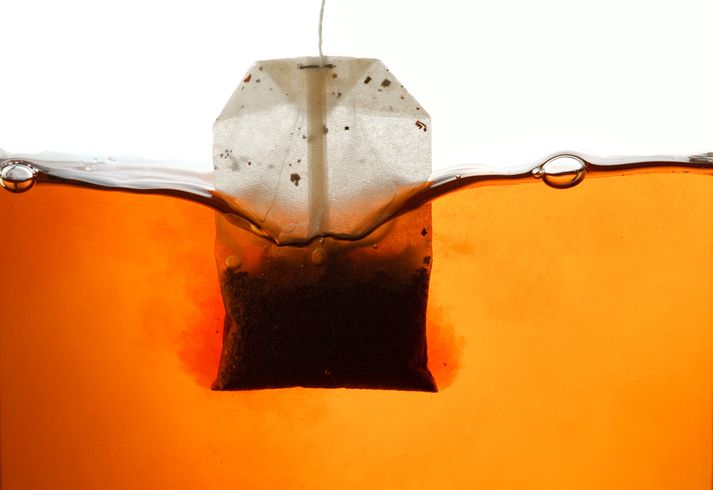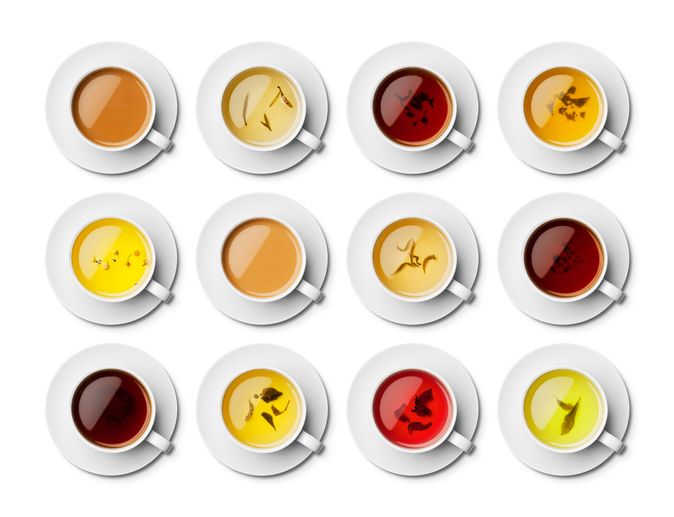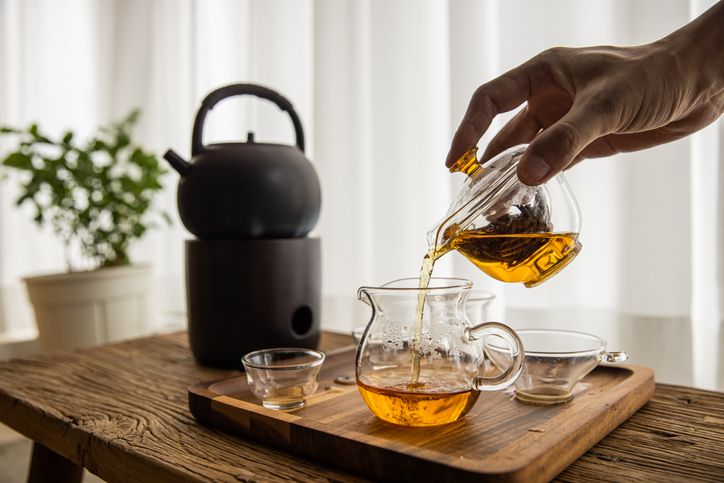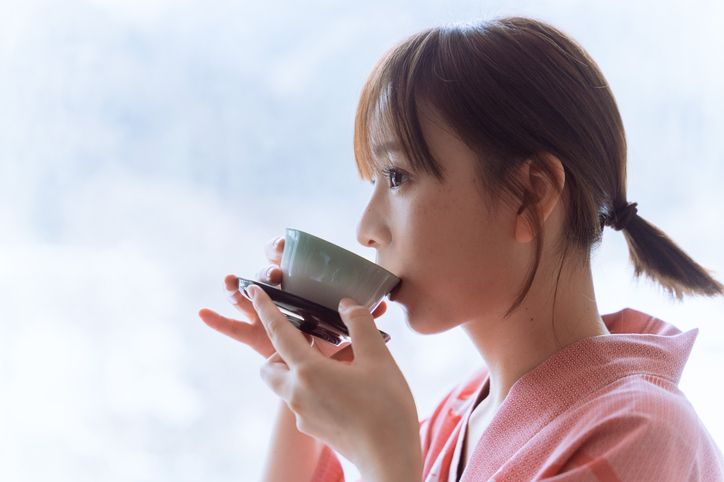
- Home
- Trend
- Weight Loss Strategies
- Acne Tips
- Hair Health Information
- Blemish Removal Tips
- Acne Scar Removal Tips
- Muscle Building Techniques
- Intimate Care Tips
- Postpartum Intimate Care
- Eye Bags Wiki
- Tips for Face Slimming
- Secret of Permanent Hair Removal
- Breast Enlargement Tips
- Cure to Snoring
- Marionette Lines
- Skin-Tightening Secrets

免費體驗
S6 Body Sculpting Treatment
1 Minute Self-Registration
Date should not be before minimal date
In the quest for weight loss, we often turn to diets, supplements, and intense exercise regimens. While these methods have their place, there's a natural and comforting ally that can support your weight loss journey – tea. Yes, that's right! Tea, with its soothing warmth and numerous health benefits, can play a significant role in helping you shed those unwanted pounds. In this article, we'll delve into the world of tea and explore how it can be a valuable asset in your quest for a healthier and leaner you.
1
Drinking Teas for Weight Loss Since Ancient Time

The practice of drinking tea for weight management has ancient origins and is not merely a modern trend. Tea consumption for its potential health benefits, including weight management, can be traced back centuries, primarily in regions where tea has been cultivated and consumed for centuries.
One of the most well-known types of tea, green tea, has a history dating back thousands of years in countries like China and Japan. Traditional Chinese medicine, for instance, has long recognized the potential health benefits of green tea, including its role in supporting metabolism and digestion.
Historically, various herbal teas and infusions have also been used in different cultures for their potential therapeutic properties, which may include aiding in weight management. These herbal remedies often have cultural and historical significance in their respective regions.
In recent years, there has been a resurgence of interest in the potential weight loss benefits of tea, particularly green tea and herbal teas. Scientific research has explored the compounds found in tea, such as catechins in green tea, which may have a modest impact on metabolism and fat oxidation.
While the modern marketing of tea as a weight loss aid has gained popularity, it's important to recognize that the concept of using tea for health and wellness has ancient roots and is rooted in various traditional practices and cultures. However, the effectiveness of tea for weight management should be considered in conjunction with a balanced diet and regular exercise, and individual results may vary.

2
The Magic of Fat-Burning Tea

Derived from the leaves of the Camellia Sinensis plant, tea comes in a diverse range of forms, each with distinct characteristics and qualities.
Green tea
Green tea stands out for its remarkable concentration of antioxidants, especially catechins. These bioactive compounds play a pivotal role in supporting various aspects of health. One of the standout features of green tea is its capacity to enhance metabolism and facilitate fat burning. Drinking green tea regularly can promote weight loss while simultaneously improving your overall well-being.
Black tea
Renowned for its robust flavour, black tea possesses compounds such as theaflavins and thearubigins. These substances have garnered attention for their potential contributions to weight management. Black tea is known to aid digestion and help regulate blood sugar levels, factors that can be instrumental in maintaining a healthy weight.
Oolong tea
Oolong tea occupies a unique position, falling between the realms of green and black tea in terms of oxidation. It contains polyphenols that enhance the body's ability to burn fat more efficiently. Drinking oolong tea is often celebrated for its capacity to complement weight loss endeavours, making it a valuable addition to a balanced lifestyle.
Herbal tea
In the realm of herbal teas, options like peppermint, ginger, and chamomile reign supreme. These caffeine-free infusions offer diverse weight loss benefits. They can help curb cravings, reduce stress levels, and enhance the digestive process, all of which play essential roles in achieving and maintaining a healthy weight.
White tea
White tea offers its unique set of benefits for those seeking to support weight loss. Its delicate flavour profile is accompanied by a wealth of antioxidants, including catechins, similar to those found in green tea. White tea is celebrated for its potential to boost metabolism and aid in fat burning. By incorporating white tea into your routine, you can harness its fat-burning properties while enjoying a refreshing and light beverage.
- The Top 10 Benefits of Exercise + 3 Most Popular Regular Physical Activity
- Fact Checking 5 Fat Reduction Tips, With Some You Should Stop Believing
- 5 Calorie Deficit Diet Strategies Recommended by Nutritionists for Effective Weight Management
- 168 Intermittent Fasting Method: 5 Tips For Weight Loss + 4 Common Pitfalls
3
How to be an 'Elegant' Tea Drinker and Enjoy Fat Loss?

1. Replace sugary drinks
One of the simplest and most effective ways to integrate tea into your weight loss plan is by substituting sugary beverages with unsweetened tea. Swap out that calorie-packed soda or energy drink for a refreshing glass of iced green tea or soothing herbal tea. This small change can significantly reduce your daily calorie intake while providing you with the benefits of tea's natural compounds.
2. Drink before meals
Harness the power of tea to control your appetite by sipping on a cup before a meal. The warmth and hydration provided by tea can impart a feeling of fullness, reducing the urge to overeat. This pre-meal ritual can be a valuable tool in managing portion sizes and calorie consumption.
3. Stay hydrated
Proper hydration is fundamental for successful weight loss, and tea can be a valuable contributor to your daily fluid intake. Certain herbal teas, such as dandelion and ginger, possess diuretic properties that can assist in shedding excess water weight. By staying well-hydrated with a variety of teas, you support your body's metabolic processes and overall health.
4. Tea detox programs
For those looking to kickstart their weight loss journey, tea detox programs have gained popularity. These programs typically involve the consumption of specific herbal teas over a designated period to cleanse the body and promote weight loss. However, it's crucial to consult with a healthcare professional before embarking on any detox program to ensure it aligns with your individual needs and health goals.

4
Attention! Lose Your Belly Fat with Other Ways if You Have These

While tea can offer potential benefits for weight loss and overall health, there are certain circumstances and conditions in which individuals should exercise caution or avoid drinking tea for weight loss:
1. Caffeine sensitivity
Some people are sensitive to caffeine, which is present in varying amounts in different types of tea. Excessive caffeine intake can lead to jitters, anxiety, increased heart rate, and sleep disturbances. If you are highly sensitive to caffeine, it's essential to choose caffeine-free herbal teas or opt for decaffeinated versions of tea.
2. Insomnia or sleep issues
Drinking tea, especially caffeinated varieties, close to bedtime can disrupt sleep patterns. Those who have this issue can't even drink bubble tea because you will end up staying up all night after that tiny bit of green tea extract. It's advisable to avoid tea in the evening if you experience insomnia or sleep-related problems.
3. Pregnancy and breastfeeding
Pregnant and breastfeeding individuals should be cautious about their tea consumption, especially regarding caffeine content. High caffeine intake during pregnancy has been associated with adverse pregnancy outcomes. It's best to consult a healthcare provider for guidance on safe tea consumption during pregnancy and breastfeeding.
4. Medical conditions
Individuals with certain medical conditions, such as gastroesophageal reflux disease (GERD), irritable bowel syndrome (IBS), or ulcers, may find that tea exacerbates their symptoms. Caffeine and other compounds in tea can sometimes irritate the digestive tract. If you have a medical condition, consult with a healthcare professional to determine if tea consumption is suitable for you.
5. Medications
Tea, particularly herbal teas, can interact with certain medications. For example, compounds in tea can affect the absorption and effectiveness of specific drugs. If you are taking medication, consult with your healthcare provider to ensure there are no adverse interactions with the tea you plan to consume.
6. Allergies or sensitivities
Some individuals may have allergies or sensitivities to specific herbs or botanicals used in herbal teas. It's important to read tea ingredient labels carefully and be aware of any known allergies or sensitivities.
7. Individual Reactions
Each person's body reacts differently to foods and beverages. If you experience any adverse effects, discomfort, or unusual symptoms after drinking tea, it's advisable to discontinue its use and consult a healthcare professional.
8. Excessive consumption
While moderate tea consumption is generally safe, excessive intake of certain herbal teas or supplements can have adverse effects. It's important not to rely solely on tea for weight loss and maintain a balanced diet and lifestyle.
免費體驗
S6 Body Sculpting Treatment
1 Minute Self-Registration
Date should not be before minimal date
5
Side effects of excessive consumption and why it is dangerous

Consuming tea in moderation is generally safe and can offer various health benefits. However, excessive tea consumption, particularly when it's heavily caffeinated, can lead to certain side effects and health concerns:
Increased Heart Rate
High caffeine intake can cause a rapid heart rate (tachycardia), palpitations, and feelings of restlessness or jitteriness.
Digestive Issues
Some individuals may experience stomach discomfort, acid reflux, or gastritis due to excessive caffeine consumption.
Iron Absorption Interference
Tea, particularly black tea, contains compounds called tannins that can inhibit the absorption of nonheme iron (the type of iron found in plant-based foods) from your diet. Consuming large amounts of tea with meals may lead to iron deficiency in susceptible individuals, such as those with iron-deficiency anaemia.
Bone Health
Excessive tea consumption, particularly in the form of very strong brews, can potentially affect bone health. Some studies suggest that high caffeine intake may lead to a reduction in bone mineral density over time, potentially increasing the risk of fractures.
Tooth Discoloration
Tea, especially black tea, can stain tooth enamel over time, leading to tooth discoloration. Regular dental care and hygiene practices can help mitigate this effect.
Dehydration
While tea is primarily composed of water, caffeinated teas can have a mild diuretic effect, leading to increased urination. In some cases, this can contribute to mild dehydration if not balanced with adequate fluid intake.
Anxiety and Nervousness
Excessive caffeine consumption can exacerbate symptoms of anxiety or nervousness in some individuals. It may lead to increased restlessness, unease, or feelings of anxiety.
Dependency
Regular and excessive caffeine intake can lead to caffeine dependency, where you may experience withdrawal symptoms, such as headaches, fatigue, and irritability, if you abruptly reduce or stop consuming caffeine.
To enjoy the benefits of tea while minimising these potential side effects, it's advisable to consume tea in moderation and be mindful of your caffeine intake. If you're sensitive to caffeine or have any underlying health conditions, consider opting for caffeine-free herbal teas or decaffeinated versions. Additionally, it's essential to maintain a balanced diet and stay hydrated by drinking plenty of water throughout the day.

6
What Else Can I Do? Let Perfect Medical Sort the Fat Accumulation Issue for You

If you have concerns about your tea consumption or its impact on your health, but you would still want to look for something that can help you lose weight without too much hassle, S6 Body Sculpting Treatment offers an efficient solution. While healthy green tea, white tea, or traditional chinese tea can aid in weight management, it is way too slow for the effects to kick in. This treatment provides a swift way to eliminate excess fat. It utilises advanced bio-laser technology to penetrate deep into fat layers, causing fat to liquefy and be eliminated by the lymphatic system and metabolic processes.
Imagine feeling self-conscious about stubborn underarm fat that doesn't respond to dietary changes or tea consumption. With S6 Body Sculpting Treatment, you can reshape this area without resorting to risky surgeries or uncomfortable injections.
Our skilled estheticians harness the power of S6 Body Sculpting Treatment to precisely target and reduce fat in specific problem areas. The bio-laser penetrates deeply into the skin, reaching the adipose tissue beneath to eliminate undesirable fat layers. Subsequently, your metabolism flushes out the dissolved fat, delivering noticeable and immediate results, bringing you closer to your desired body composition in a shorter time. This non-invasive procedure offers a convenient and effective path to achieving your body goals, so you can truly sit tight, drink your tea, and enjoy the benefits of losing weight!

免費體驗
S6 Body Sculpting Treatment
1 Minute Self-Registration
Date should not be before minimal date
FAQ

1. Is it safe to drink tea every day for weight loss?
Yes, it is generally safe to include tea as a part of your daily routine in moderate amounts. Many types of tea, especially herbal and green teas, are packed with antioxidants and other beneficial compounds that can support overall health and potentially aid in weight loss. However, it's important to consume tea in moderation, as excessive intake, particularly of caffeinated tea, can lead to side effects like insomnia, increased heart rate, or digestive discomfort. Adjust your tea consumption to your tolerance level and preferences to ensure a safe and enjoyable experience.
2. I don't like to drink tea; what can I do with the tea leaves? Are there recipes to transform them into something else?
Certainly! Tea leaves can be quite versatile. Apart from steeping them for tea, you can explore various culinary uses. For example, you can incorporate tea leaves into recipes for desserts, marinades, or even as a flavorful rub for meats. Green tea ice cream, jasmine tea-infused rice, or black tea-infused cocktails are some creative options. Experiment with different recipes to discover exciting ways to enjoy the flavours and potential health benefits of tea leaves in your meals.
3. Are traditional Chinese teas effective for weight loss?
The effectiveness of traditional Chinese teas for weight loss can vary significantly because there are numerous variants of Chinese tea, each with its unique properties. Green tea, oolong tea, and pu-erh tea are among the traditional Chinese teas that have been associated with potential weight loss benefits. However, the impact of these teas depends on factors like the specific tea variety, brewing method, and individual metabolism. While some studies suggest that certain Chinese teas may help boost metabolism and fat burning, it's important to remember that no tea can replace a balanced diet and regular exercise as the foundation for effective and sustainable weight management.
4. What are the tea products that can increase fat burning?
If you're looking for tea products that can aid in fat burning, consider those containing ingredients known for their potential fat-burning properties. Green tea extracts, which are rich in catechins, are commonly found in supplements and weight loss products. Additionally, herbal teas with ingredients like green coffee bean extract or guarana may be marketed as fat-burning products due to their caffeine content, which can temporarily boost metabolism. However, it's essential to approach such products with caution and consult with a healthcare professional before incorporating them into your routine.
5. How does tea interact with body fat and body weight?
Tea can interact with body fat and body weight through various mechanisms. The specific effects depend on the type of tea and individual factors. For example, green tea is often associated with increased metabolism and fat oxidation due to its catechin content. Additionally, some herbal teas can promote feelings of fullness, potentially reducing calorie intake. Moreover, the act of sipping warm tea can have a calming effect, which may help curb emotional eating. While tea can play a role in supporting weight management, it should be part of a comprehensive approach that includes a balanced diet and regular physical activity for optimal results.








